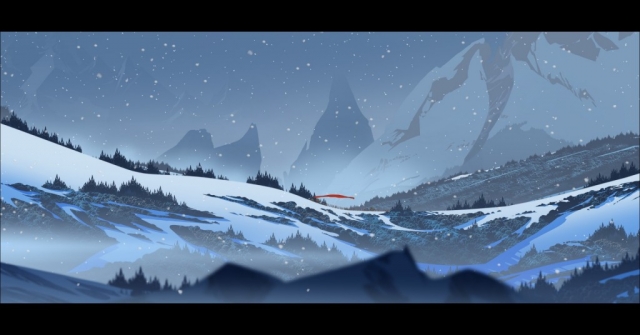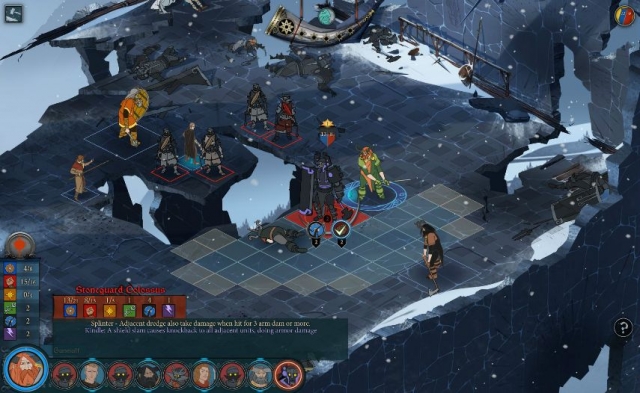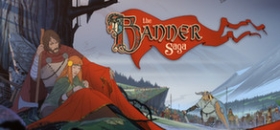
The Banner Saga Review
The Banner Saga is, at its core, the fantasy Viking edition of The Oregon Trail, and has players take control of a caravan leader as they attempt to escape oncoming forces of unholy monsters and the potential end of the world. The game places an emphasis on decision making and mistakes, both in dialogue trees and combat, meaning that this is another one of those games where the player really needs to think before they act.

The most striking thing about this game is the artwork, which is very reminiscent of the old hand-drawn cartoons that I would watch as a child. Monsters and heroes alike are stunningly beautiful, which really works in The Banner Saga’s favour as the player is forced to spend most of their time watching these pretty but almost unmoving sprites overlaid by text. Of course, the story was intriguing enough that I didn’t stop playing, but the game didn’t feel interactive enough to keep me properly entertained. I think this is an issue that a lot of the game faces; when not engaging in turn-based combat or scrabbling around for supplies in a settlement, the caravan moves from one picturesque side of the screen to the other, flying their colourful banner and walking at a pace that would get anyone killed just from boredom. And yet, despite what in any other game I would call a low point, the automatic walking stages were some of the tensest, most on the edge of my seat moments that were presented within the game. The day counter spins around at a fair pace, and with low supply levels and even lower morale levels, the player can often be stuck between deciding to push the caravan to their limit and risk angering the group, or resting to keep people happy, knowing that they will slowly starve and die.
If The Banner Saga has taught me anything, it’s that I’m too forgiving and that game developers relentlessly punish heroism. I remember one crucial element of the story being particularly devastating; due to one of my many, many altruistic deeds, lots of people died, all of my food was gone and I lost at least one or two of my usable units. This game is fabulous at making decisions meaningful in the long term, with the key element being that, each and every time, the player could have sort have seen the outcome and is ultimately responsible. Those bandits that you helped took all of our food? You did that, and now everyone’s starving; sit in the corner and think about what you’ve done. The onslaught of personal blunders is so overwhelming in my playthrough that I don’t know why I’m still leading the caravan. Probably because every other candidate is dead!

Combat and actual gameplay within The Banner Saga has me completely torn; on the one hand, it felt clumsy and obtrusive, and there really wasn’t enough of it to completely prepare myself for the later battles, which seemed to suddenly ramp up the difficulty. However, on the other, the contrast that it had to the very passive majority of the game made it feel all the more exciting as my strategic ability was finally being tested. The introduction of a degradable armour mechanic adds an extra layer of complexity to the battles as it causes the player to consider whether their fighter should weaken an opponent for another unit to take it out, or risk doing minimal damage over a slightly longer period of time. Should a player really need to do extra damage on a turn, they are able to use some of their limited willpower points to supercharge an attack and decimate a single unit (unless, like me, you use it up in the first few turns with no real benefit). The game takes a decidedly different approach to selecting which unit should move first, taking each character’s initiative number and comparing it to everyone else in their party, rather than over all units as a whole. This means that being outnumbered in a combative situation results in a faster rotation of units, while retaining the number of turns for each side. My main issue with the combat was the lack of control that the player has over the camera; I like to be able to manoeuvre my viewpoint around the battlefield, determining which squares to occupy and deciding which paths will ultimately kill me. The Banner Saga lacks the controls to rotate the battlefield, resulting in some really confusing skirmishes when more than two fighters were involved. This really becomes an issue when the player is forced to control giants, as they end up just forming a dam that doesn’t let anyone else past and prevents the player from seeing the rest of their options.
I love The Banner Saga, even though it likes to punish me and make me feel stupid and call me names. I love it for its story, and for the visual spectacle, because that is what this game is really all about. Playing through it feels as though I have been teleported back to my childhood to take part in all of those cartoons that would grip me for hours on end, and I finally feel as though I can forgive the protagonists for all those stupid mistakes because I have lived them. Granted, some of the combat mechanics aren’t as solid as I would expect from most RPGs, but I feel as though The Banner Saga includes enough unique material and tweaks enough features to make it stand out as a brilliantly satisfying game.
The Banner Saga (Reviewed on PlayStation 4)
This game is good, with a few negatives.
Despite spending most of my play time watching characters talk or travel from one side of the screen to the other, The Banner Saga includes an enthralling narrative and makes use of some inventive combat mechanics.









COMMENTS